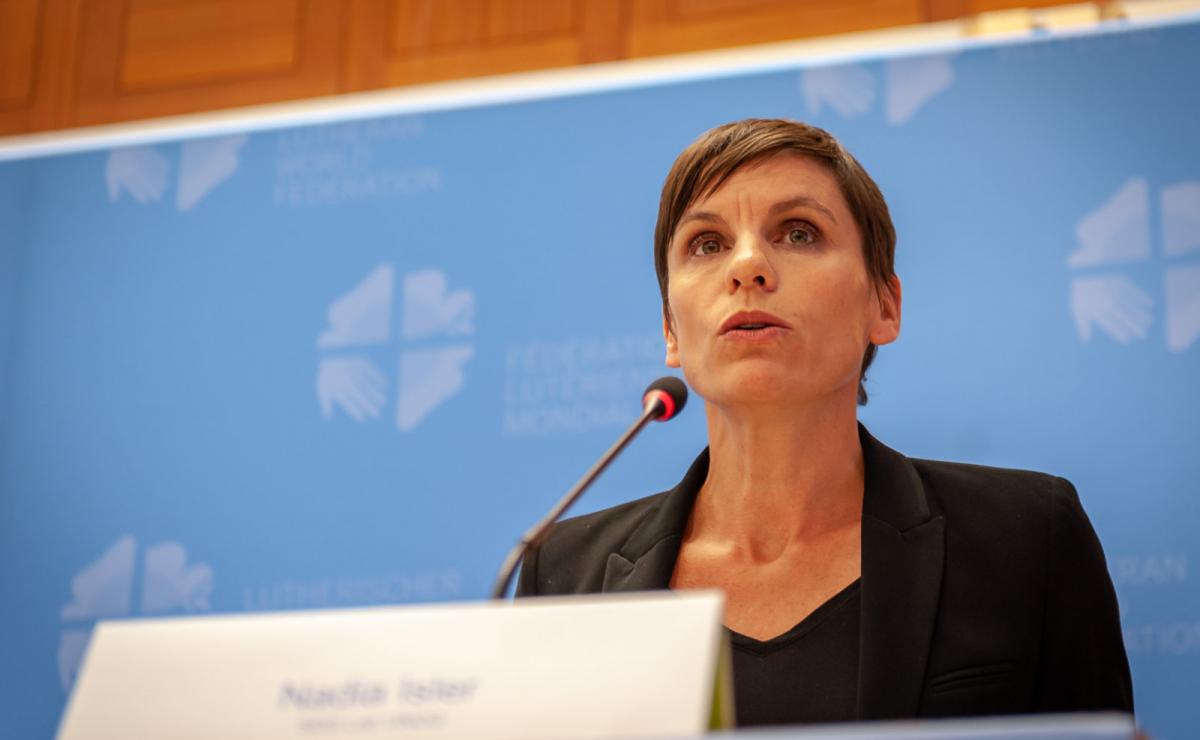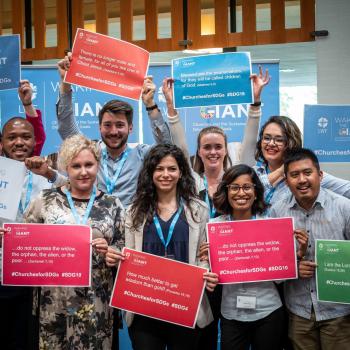“As a matter of faith: leave no one behind”

LWF launches global initiative adding the presence, witness and contributions of churches to Sustainable Development Goals
(LWI) With representatives of the United Nations and churches in Colombia, Liberia, Tanzania and the US, as well as many other partners, the Lutheran World Federation (LWF) launched its initiative “Waking the Giant” on the evening of 10 October.
Waking the Giant is a global initiative of the LWF to build the capacity of churches to contribute to the 2030 UN Agenda for Sustainable Development. It is implemented in connection with global and local ecumenical structures.
At the global level, the initiative provides churches and church-related actors with tools and training to relate their work to the Sustainable Development Goals (SDGs). Currently, the initiative is implemented in four target countries: Colombia, Liberia, Tanzania and the United States.
“Counting the churches in”
“For decades, in many cases even for centuries, churches have been engaged in compassionate service to the neighbor. During all this time, “leaving no one behind” has been an inspiring vision stemming from deepest convictions of faith,” said LWF General Secretary Rev. Dr Martin Junge, adding that he saw the SDGs as a new opportunity to express this long-standing engagement and commitment.
“Waking the Giant is about counting the churches in, mobilizing them, connecting them and equipping them to be actors within the global effort to achieve the Sustainable Development Goals,” he said.
[blockquote cite="Nadia Isler, Director of the United Nations SDG Lab"]Waking the Giant is a 'unique opportunity in a highly globalized world.'[/blockquote]
Director of the United Nations SDG Lab, Nadia Isler, said that Waking the Giant was a “unique opportunity in a highly globalized world” and that “the engagement of faith-based organizations in sustainable development goals is most timely.” In her keynote address she emphasized the role of churches and faith-based organizations in supporting development on national and local levels.
In a panel discussion, representatives from the initial target countries explored church engagement with development in their contexts. In a moving report, Rev Christopher Wleh Toe I., General Secretary of the Liberia Council of Churches, detailed how during the Ebola crisis congregations used the bible to promote hygiene and advocate against practices that would have helped spread infection. “Church leaders provided food, medical supplies and protective gear, and they built health centers” he said, naming some of the interventions.
Crucial role in development
Alfonso Barragues, Deputy Director of the United Nations Fund for Population (UNFPA), also valued churches and faith actors for engagement far beyond being critical service providers in health and education. He talked about their role in advocating for gender equality and against harmful cultural practices. “The role of faith-based organizations in identifying and challenging discriminating social norms is crucial in development,” Barragues concluded.
“My country has known the Lutheran family for years,” H.E. Mr. Paul Wolokollie Tate, chargé d’affaires of the Liberia Permanent Mission to the UN at Geneva, added. “Their main operations beside churches at the time were schools.” The ambassador also emphasized the churches’ critical voice in advocacy and their work in peacebuilding. “Without the churches, our country would be very different,” Tate concluded.
Mikka McCracken, director of planning and engagement, with the Evangelical Lutheran Church in America (ELCA) World Hunger programme, shared similar observations from the ELCA ministry working toward a just world where all are fed, in which more than 96 percent of the ELCA churches’ congregations are engaged. “As Christians we believe in a God of abundance, we believe that God came in Christ to the world so that all might have life and have it abundantly. As Lutherans we believe we are freed by grace to love and serve our neighbors and neighborhoods. As a church we need to leave no one behind.”


